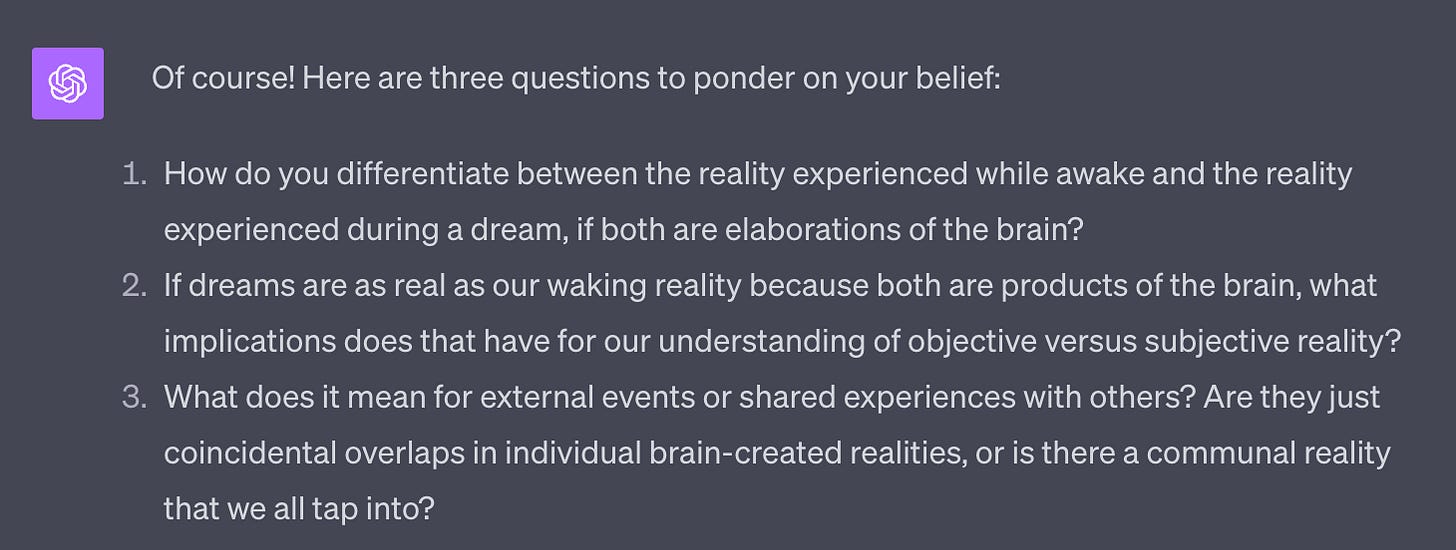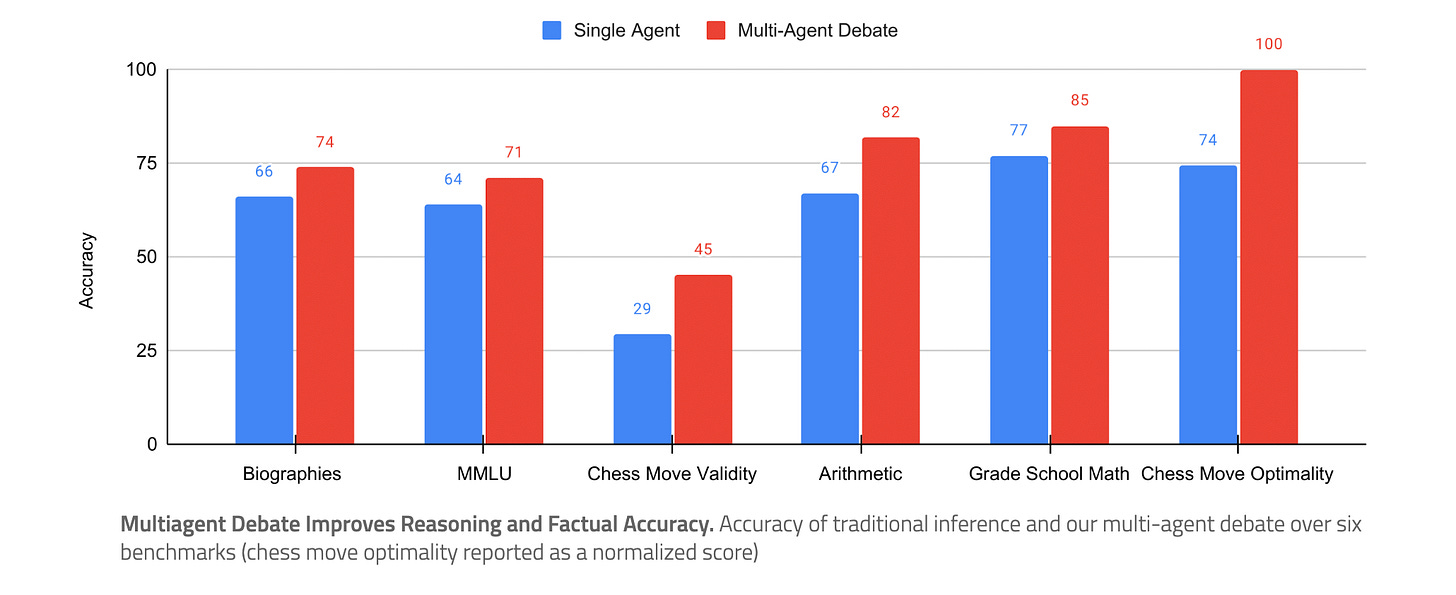How can Philosophy elevate Large Language Models?
LLMs can diffuse philosophy at scale, spreading best thinking practices everywhere
Dear all, in this post you will see:
How the Socratic Method can power Human-AI and AI-to-AI communication;
Some jobs and research opportunities from my network.
How can Philosophy elevate LLMs?
Bridging the gap between epochs, imagine a world in which the ancient wisdom of philosophers is intertwined with the beating heart of modern technology. A world in which ancient teachings are integrated into the latest technologies. This possibility of connecting the seemingly disparate things is something fascinating.
Let’s go to the point.
What do Socrates, Plato and many other philosophers have to teach in the age of Large Language Models (LLMs)?
Recently, I had the opportunity to embed ancient philosophical methods in several AI project, ranging from education to industrial applications. In this post we will answer the above question by investigating the Socratic Method and its derivatives once implemented in LLMs.
The Socratic Method: what is about?
Developed by the Greek philosopher Socrates, and described in Plato’s dialogue, “Phaedo”, the Socratic Method is a dialogue between teacher and students that goes as follow. The former does not directly impart knowledge but leads by posing thought-provoking questions to the latter, in a concerted effort to explore the underlying beliefs that shape the students views and opinions.
In other words, the Socratic Method consist of asking continual questions until a contradiction is exposed, thus proving the fallacy of the initial assumption. The Socratic Method is used to develop critical thinking and self-reflection skills in students and enable them to approach the law as intellectuals. When learning, our ultimate goal should be not merely to understand or internalize the ideas but to actively challenge them.
The Socratic Method can be particularly effective especially for simple questions, such as whether the world around us is real, revealing hidden subtleties and complexities in subjects that may otherwise appear simple. While the Sophists tried to demonstrate their knowledge, Socrates did his best to demonstrate his (and everybody else’s) ignorance.
The Socratic Method can enhance Human-AI communication
In recent times, renowned psychologists such as Piaget and Vygotsky have highlighted the crucial role of collaborative dialogue in promoting the development of human cognitive abilities. This has significantly influenced the field of educational theory.
But what about Human-AI communication? One way to use LLMs for this purpose is by presenting our thoughts or beliefs to the model and asking it to pose critical questions, pushing us to think more deeply about our views. This process can reveal underlying assumptions, inconsistencies, or gaps in our reasoning, helping us become more aware of the foundations of our beliefs and prompting us to question them further.
For example, we might ask GPT4 to challenge our position on a controversial topic or to explore potential counterarguments to an idea we hold dear. By engaging with the model in this manner, we expose ourselves to alternative perspectives, encouraging us to think critically and consider our views in a broader context. In essence, using large language models to apply the Socratic method on ourselves allows us to harness the power of these tools for self-improvement and intellectual growth.
GPT-4 reply to this prompt is:
Personally, I find question number three extremely interesting and thoughtful. It is exactly the question I would ask those people who think that any result of our mind is to be considered real, even dreams. I just let you imagine how many applications it could have, from education to consultancy to even scientific research.
The Socratic Method can enhance AI-to-AI communication
We can exploit the Socratic Method not only for Human-AI communication, but also for AI-to-AI communication. Have you wondered what a dialogue between two separate LLMs looks like?
Several AI Researchers are introducing different strategies based on the Socratic Method that utilize multiple LLMs to engage in discussions and debates with each other, with the purpose of providing the best possible answer to a given task. Several results show that collaborative debates among LLMs enhance accuracy, reduce biases, and foster critical thinking, providing diverse perspectives and leading to more objective responses (as show in the figure below, extracted from the paper: Improving Factuality and Reasoning in Language Models through Multiagent Debate).
Even more interesting is the possibility to initiate one base LLM to play different roles (expert in something, fact checker etc.). This setup has the potential to unlock problem-solving capabilities and bring to life innovative solutions.
For instance, one LLM can play the role of an expert in biology while a second one the role of an expert in climate solutions. A third one can be the fact checker, monitoring that the LLMs brainstorming is focused on finding which bacteria can help absorbing more CO2. After some iterations the different LLMs might ground new ideas. As discussed in a recent talk of mine, this opens the door to a kind of Sociology of AI in which understanding the collective behavior of different collaborative LLMs will play an essential role. There are many applications (and sometimes ethical implications), and I do not see the future far off in which humans can delegate to small groups of LLM-based AI agents problems to explore and perhaps solve.
In conclusion, I like to think that LLMs can be a way to see philosophy at scale, spreading best thinking practices everywhere and equally.
Some references:
Improving Factuality and Reasoning in Language Models through Multiagent Debate;
The Socratic Method for Self-Discovery in Large Language Models.
Opportunities, talks, and events
I share some opportunities in you might find interesting:
🚀 Job opportunity: An Italian well-founded startup, applying Deep Learning in the fashion sector is looking for a Machine Learning Scientist or AI developer (more info here).
👨💻 Learning opportunity: A new session of the Pi School of AI will start soon. Several grants available for early career AI scientists, engineers, and developers (Apply here!).
🎙 Tech Talk by Zhenwen Liang at Pi School: Building Efficient Mathematical Reasoners in the LLM era.
🔬Research opportunity: Data Engineer at the Research and Innovation Institute (RIT) at Area Science Park (Trieste).
If you would like to get in touch with me or view my lectures and courses (technical and non-technical), you can find everything here.
You can find me on LinkedIn or Twitter, where I share Science & Tech news. If you wish to book a call or view my lectures and courses (technical and non-technical), you can find me here.







